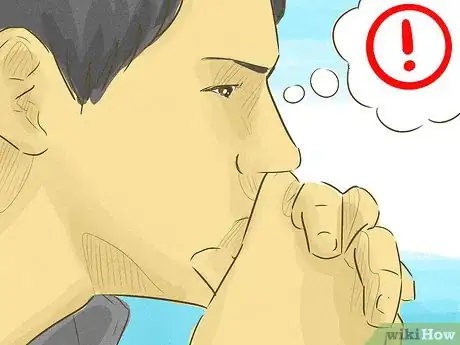This article was co-authored by Kelli Miller, LCSW, MSW. Kelli Miller is a Psychotherapist based in Los Angeles, California. Kelli specializes in individual and couples therapy focusing on relationships, depression, anxiety, sexuality, communication, parenting, and more. Kelli also facilitates groups for those struggling with alcohol and drug addiction as well as anger management groups. She is the author of “Professor Kelli’s Guide to Finding a Husband” and the award-winning and best-selling book “Thriving with ADHD”. Kelli co-hosted an advice show on LA Talk Radio and is a relationship expert for The Examiner. She received her MSW (Masters of Social Work) from the University of Pennsylvania and a BA in Sociology/Health from the University of Florida.
There are 9 references cited in this article, which can be found at the bottom of the page.
This article has been viewed 44,926 times.
Are you forced to interact with a rude classmate or co-worker? Or just a person that makes you feel powerless? If so, then you might be tired of feeling this way and want to stand up to the person. Standing up to someone can help you to assert your boundaries and feel more in control of your situation. By boosting you confidence before the confrontation, using assertive communication, and using the situation as a learning experience, standing up to someone can be an effective way to improve your situation.
Steps
Finding Your Confidence
-
1Take a deep breath. Standing up to someone can be stressful and it works better if you are feeling calm. Take a few deep breaths to calm your nerves and to help prepare yourself for the confrontation. Don't immediately react to the negative person without taking a deep breath.
- Deep breathing can help to slower your heart rate, and relax your muscles. You may also feel less stressed about the situation.[1]
- Breathe in deeply through your nose as you count up to five, and then breathe out through your mouth as you count down from five.
-
2Focus on what you can do. Rude people or bullies may try to make you feel guilty, anxious, fearful, or embarrassed. Bullying also has a lot to do with control.[2] The bully wants to affect you emotionally, such as by making you angry, sad, or fearful. By staying in control of your emotions, you can avoid giving the bully the satisfaction of affecting you emotionally.
- Try focusing on the bigger picture of who is in control rather than on the things the bully says or does to you. Remind yourself that you are in control of what you say and do, not the bully.
- Identify a healthy way to express your feelings. You could do this by writing in a journal, calling a friend, or talking out loud to yourself.
- See if there are ways to redirect your frustrations with that person. For example, you might go for a walk, prepare a meal, or listen to some music.
Advertisement -
3Plan what you are going to say.[3] Being unprepared to stand up to someone may increase your nervousness. That is why it is better to be prepared. Before you confront someone about their behavior, think carefully about your words. Name-calling and belittling them will only make them defensive. Think about ways to be serious and specific.
- If there is a specific thing that someone is saying or doing to you, be specific in how and why you want them to stop. Explain your reasons, and the consequences if they don't.
- Consider saying something like, "Please don't take my folders without asking. This is my personal space, and if you need something, please ask me directly. Hopefully this won't happen again. But if it continues, I'll need to talk with the teacher/manager."
- Don't talk about using an act of violence as a consequence for the person's behavior.
-
4Try power posing. Power posing is the practice of getting into assertive, dominant physical positions to change your mindset. You can do a power pose for one minute and experience a large boost in self-confidence. Try doing a few power poses to build up your confidence before you confront this person. You can even stay in a power pose while you are standing up to someone.[4]
- Try the Wonder Woman or Superman pose. Stand with your feet shoulder width apart and place your hands on your hips. Then, lift up your chin and press out your chest slightly, just like a superhero. Stay in this pose for a minute to prepare yourself or maintain this position while you are standing up to the person.
- Do the Obama pose. If you are sitting down, then a great way to look and feel more powerful (and nonchalant) is to lean back in your chair, put your feet up on a table, and place your hands behind your head.
- Try the performer. Put your hands up above your head, as if you have just crossed a finish line in a race and you are celebrating your victory. This is a good pose to boost confidence, but it might look a little strange if you do it while you confront someone.
Being Assertive
-
1Keep your emotions in check. Dealing with difficult people can make anyone angry, but it's not a healthy way to start an effective conversation. If you're feeling unable to be cool and calm, or feel like your emotions are too much at the moment, take a step back and breath.
- When beginning to speak with someone about a conflict, keep your voice even and calm.[5]
- Consider saying, "I know that things are getting heated, but I'm just trying to figure out how we can handle this."
- Avoid name-calling, belittling, and threatening. Threatening someone will likely escalate the situation, and could be unsafe. If you feel that violence may occur if standing up to someone, talk with a person who is in charge before proceeding.
-
2Use your body language. Make eye contact when talking with the person. Keep a neutral or positive face if possible. Stand tall and upright.
- Practicing in the mirror may help you. Non-verbal cues can be just as meaningful as words in how to stand up to someone. [6]
- Avoid body language that threatens or demeans the person. You want to be his or her equal, not another bully.
-
3Be clear about what is bothering you.[7] If you are making vague statements about a person's behavior, they are less likely to change. You need to speak your mind in a thoughtful and clear way, so that it is easy for the person to understand why you are upset or frustrated. If you can get them to "walk in your shoes," they will be better able to follow what you ask.
- Keep the conversation brief and concise. You don't need to use this as an opportunity to blame them for all their faults. Focus only on the issue at hand.[8]
- Consider saying, "I am uneasy about the way you just talked to my friend and I. Please think about what you say before you say it. And we'll respect you in the same way."
-
4Express your feelings constructively. Use statements that focus less on the person, and more on how their actions make you feel.[9] By focusing on how a person's behavior is making you feel, it sounds less accusatory. You want to avoid making them defensive and angry.
- Consider using 'I' statements such "I disagree with some of the facts that you presented" instead of "You're wrong" or "I am upset with how you don't complete your part of the assignment on time" instead of "You're lazy."
-
5Repeat these assertive behaviors. Being assertive one time will probably not be enough to stop the bully. The bully may need several reminders to stop bullying. That is why it is important to repeat these assertive behaviors and make them part of your regular behavior. By practicing these assertive behaviors on a regular basis, they will become habitual and this will make it easier for you to stand up for yourself.
Gaining Perspective
-
1Understand that rude people may not change overnight. While it's good to stand up to someone, it's unlikely that they will change their behavior completely. Be realistic that change may not happen overnight, or at all. Change will most likely be small at first.[10]
- Making the issue known has the greatest potential for change, but it will take time for actual change to occur.
- See yourself as helping the negative person become more aware of the issue.
-
2Gain perspective through your friends and family. Your friends and family may have a different take on how to handle a negative person. Be aware of what might work, and not work, in this particular situation. Consider asking them for your support, or being present, when you need to stand up to someone. [[11]
- What works for one person may not always work for another. But it's good to get a wide variety of perspectives rather than keeping it to yourself.
-
3Get advice from an authority figure or mentor. If you are a teenager or younger, sometimes it is necessary to involve adults such as teachers, parents, or other adults. If you are an adult encountering a negative person in the workplace, you may want to discuss the issue with a supervisor.
- A person in authority can help you to handle the situation more formally, with specific consequences. This is largely done after an issue cannot be resolved informally.
- While it is generally appropriate to resolve an issue informally with someone, don't let a negative person continue to frustrate you for weeks or months. Be willing to speak out formally if needed.
-
4Be proud of yourself. Even if the person does not heed your request to back off, it is important for you to acknowledge your success in being assertive and standing up for yourself. Try looking yourself in the mirror and congratulating yourself. Remember to be proud of yourself every time you stand up for yourself.
Expert Q&A
Did you know you can get expert answers for this article?
Unlock expert answers by supporting wikiHow
-
QuestionHow can I stand up for myself without being rude?
 Kelli Miller, LCSW, MSWKelli Miller is a Psychotherapist based in Los Angeles, California. Kelli specializes in individual and couples therapy focusing on relationships, depression, anxiety, sexuality, communication, parenting, and more. Kelli also facilitates groups for those struggling with alcohol and drug addiction as well as anger management groups. She is the author of “Professor Kelli’s Guide to Finding a Husband” and the award-winning and best-selling book “Thriving with ADHD”. Kelli co-hosted an advice show on LA Talk Radio and is a relationship expert for The Examiner. She received her MSW (Masters of Social Work) from the University of Pennsylvania and a BA in Sociology/Health from the University of Florida.
Kelli Miller, LCSW, MSWKelli Miller is a Psychotherapist based in Los Angeles, California. Kelli specializes in individual and couples therapy focusing on relationships, depression, anxiety, sexuality, communication, parenting, and more. Kelli also facilitates groups for those struggling with alcohol and drug addiction as well as anger management groups. She is the author of “Professor Kelli’s Guide to Finding a Husband” and the award-winning and best-selling book “Thriving with ADHD”. Kelli co-hosted an advice show on LA Talk Radio and is a relationship expert for The Examiner. She received her MSW (Masters of Social Work) from the University of Pennsylvania and a BA in Sociology/Health from the University of Florida.
Psychotherapist
Warnings
- The negative person might try to ignore you, but don't give up. Continue to talk with him or her unless the tension has escalated rapidly, and you feel unsafe. If so, you may need a third-party such as a parent, teacher, mentor, or co-worker to assist with this conversation.⧼thumbs_response⧽
References
- ↑ http://www.stress.org/take-a-deep-breath/
- ↑ https://www.stopbullying.gov/what-is-bullying/index.html
- ↑ Kelli Miller, LCSW, MSW. Psychotherapist. Expert Interview. 11 June 2020.
- ↑ http://www.businessinsider.com/amy-cuddy-power-posing-boosts-your-confidence-2015-12/#when-youre-pitching-an-idea-rest-your-feet-on-the-table-clasp-your-hands-behind-your-head-and-lean-back-2
- ↑ http://www.mayoclinic.org/healthy-lifestyle/stress-management/in-depth/assertive/art-20044644?pg=2
- ↑ http://www.mayoclinic.org/healthy-lifestyle/stress-management/in-depth/assertive/art-20044644?pg=2
- ↑ Kelli Miller, LCSW, MSW. Psychotherapist. Expert Interview. 11 June 2020.
- ↑ http://edition.cnn.com/2011/LIVING/06/01/handle.rude.coworkers.cb/
- ↑ Kelli Miller, LCSW, MSW. Psychotherapist. Expert Interview. 11 June 2020.









































































Medical Disclaimer
The content of this article is not intended to be a substitute for professional medical advice, examination, diagnosis, or treatment. You should always contact your doctor or other qualified healthcare professional before starting, changing, or stopping any kind of health treatment.
Read More...